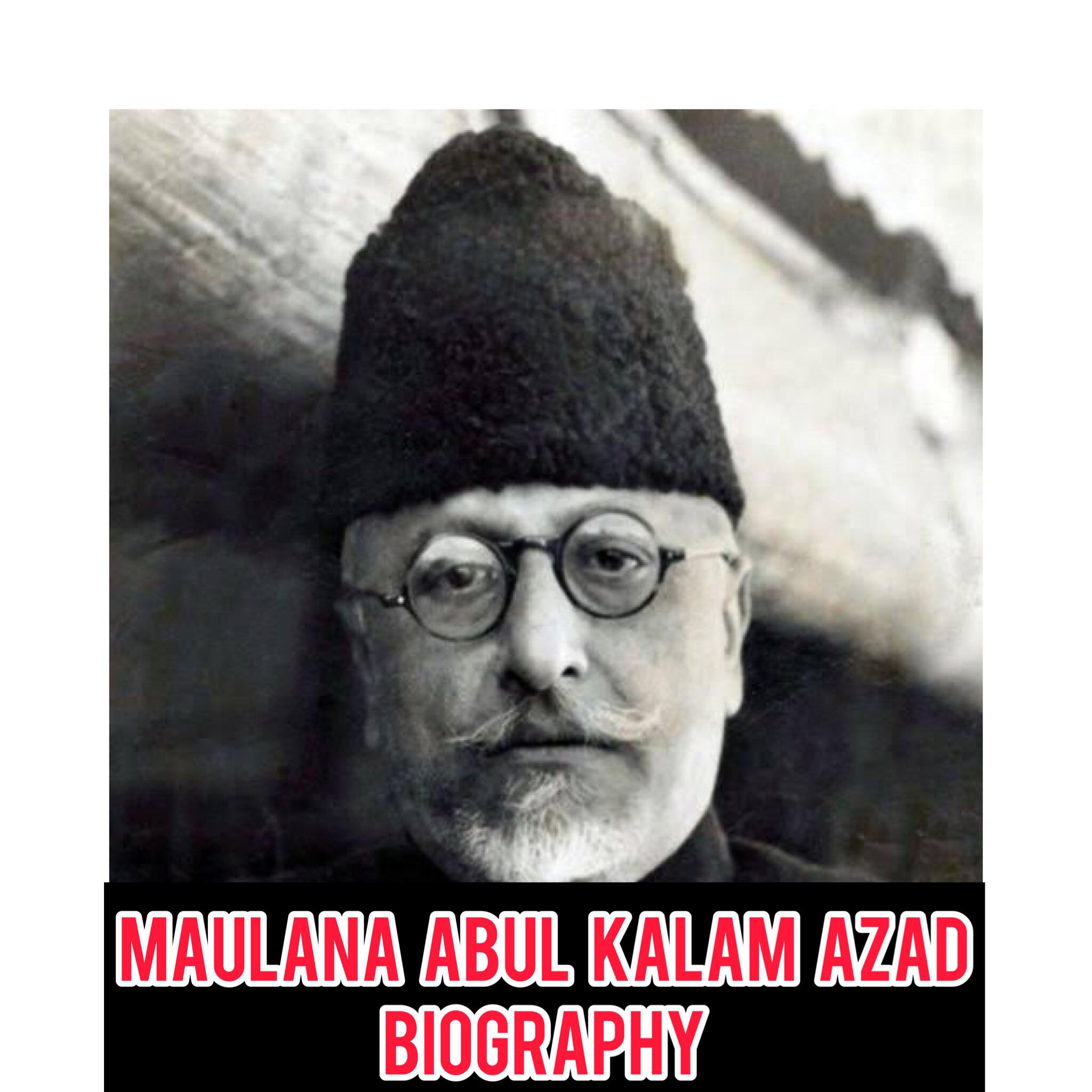
Maulana Abul Kalam Azad Biography In English
Maulana Abdul Kalam Azad was a distinguished Indian scholar, Islamic theologian, and senior leader of the Indian National Congress during the nation’s fight for independence. Born on November 11, 1888, in Mecca, his full name is Abdul Kalam Ghulam Muhiyuddin Ahmed bin Khairuddin Al-Hussaini Azad. Commonly addressed as Maulana Azad, with “Maulana” signifying ‘Our Master,’ he adopted Azad as his pen name. Maulana Abdul Azad, known for his unwavering integrity, made significant contributions throughout his life.
In his youth, Maulana Azad composed numerous Urdu poems and delved into religious and philosophical writings. As a journalist, he penned articles criticizing British rule, propelling him into the Indian independence movement. Maulana Azad assumed leadership of the Khilafat movement, aligning himself with Mahatma Gandhi’s non-violent approach against British rule. Inspired by Gandhi’s principles, he played a pivotal role in organizing the non-cooperation movement in protest of the 1919 Rowlatt Acts. At the age of 35, Maulana Azad became the youngest president of the National Congress.
In October 1920, without British government assistance, Maulana Azad was elected as a member of the foundation committee for the establishment of Jamia Millia Islamia in Aligarh, Uttar Pradesh. In 1931, he spearheaded the Dharasana Satyagraha. As a key national leader in the independence movement, Maulana Azad contributed to shaping India’s secular and socialist ideologies. He played a crucial role in initiating the Quit India rebellion and faced imprisonment alongside fellow Congress members.
Maulana Azad dedicated efforts to foster Hindu-Muslim unity through his Al-Hilal newspaper, firmly believing that a united Indian populace would lead the country to independence. His commitment to India’s independence and his role in shaping its socio-political landscape make Maulana Abdul Azad a revered figure in Indian history.
Personal Info
- Abdul kalam Full Name: Sayyid Ghulam Muhiyuddin Ahmed bin Khairuddin Al Hussaini
- Date Of Birth: 11 November 1888
- When did Abdul kalam Die: 22 February 1958
- Age (At the Time of Death): 69
Early Life History of Maulana Abdul kalam Azad
Maulana Azad, originally named Sayyid Ghulam Muhiyuddin Ahmed bin Khairuddin Al Hussaini, adopted the moniker Maulana Abdul Kalam Azad. Born on November 11, 1888, in Makkah, he was the son of Muhammad Khairuddin, a Bengali Muslim scholar of Afghan descent, renowned for his scholarly works. His mother, Sheikha Alia bint Mohammad, hailed from a respected lineage, with her father, Sheikh Mohammad bin Zaher Alwatri, being a distinguished scholar from Medina.
Raised in a traditional and orthodox family, Maulana Azad received his initial Islamic education. The family relocated to Calcutta in 1890, where he was homeschooled and pursued self-directed learning. Initially taught by his father, he later received instruction from various teachers across diverse fields. Azad, groomed for a clerical role, delved into traditional subjects and even undertook the reinterpretation of The Holy Quran. Acquiring proficiency in Arabic and Persian during his teenage years, he expanded his knowledge to encompass geometry, mathematics, philosophy, algebra, world history, English, and politics.
With an insatiable appetite for learning, Azad established a library, debating society, and reading room before turning twelve. His literary endeavors began early, producing a biography of Al-Ghazali and contributing articles to the literary magazine Makhzan at the tender age of fourteen. Teaching students twice his age at fifteen, he completed the traditional course of study by sixteen. By 1900, Azad was the editor of the weekly magazine Al-Misbah, and in 1903, he initiated the monthly journal Lissan-us-Sidq.
At the age of 13, Azad entered matrimony with Zulaikha Begum, a young Muslim girl. His intellectual journey also led him to explore the pan-Islamic doctrines of Jamaluddin Afghani and the Aligarh thoughts of Sir Syed Ahmed Khan. Imbued with the Pan-Islamic spirit, he traveled to countries such as Iraq, Egypt, Syria, and Afghanistan, engaging with the doctrines further. His visit to Egypt exposed him to Arab revolutionary activists, kindling a national revolutionary spirit within him.
Maulana Abul Kalam Azad Career
Maulana Azad played a significant role in the political landscape. His involvement in the Congress working committee, as well as holding positions such as general secretary and president, showcased his dedication to Indian politics. In 1928, a notable friendship with Jawaharlal Nehru led him to embrace socialist ideals, believing in its potential to combat inequality, poverty, and other national challenges.
Maulana Azad was instrumental in naming the Muslim political party Majlis-e-Ahrar-ul-Islam. Embracing Mahatma Gandhi’s ideals, he staunchly believed in nonviolence as the means to attain India’s independence from British rule. During the 1930 Dandi Salt March, Azad organized and led a nonviolent raid on the Dharasana salt works in protest of increasing salt tax and production restrictions. His participation led to imprisonment between 1930 and 1934.
In 1931, Azad, along with other activists, was released from jail following the Gandhi-Irwin pact. He played a crucial role in organizing the Congress election campaign in 1935, actively fundraising, selecting candidates, and mobilizing volunteers to educate the public on the importance of elections.
Supporting Jawaharlal Nehru’s Congress presidency bid in 1936, Azad backed the resolution favoring socialism. He continued to support Nehru’s reelection in 1937 and engaged in conversations with Jinnah and the Muslim League regarding Congress-League coalition and broader political cooperation from 1935 to 1937.
Returning from Egypt, Azad met revolutionaries Aurobindo Ghosh and Sri Shyam Sundar Chakravarty, sparking his commitment to India’s independence. He joined the revolutionary movement against British rule, establishing secret centers in North India and Bombay. Azad successfully dispelled rumors of British manipulation using the Muslim community against the freedom struggle, fostering unity among revolutionaries.
In 1912, Azad initiated the weekly journal Al-Hilal in Urdu, aiming to raise awareness of an independent India and recruit revolutionaries from the Muslim community. Despite its ban in 1914, Azad continued promoting Indian nationalism through another weekly magazine, Al-Balagh. His imprisonment for four years at Ranchi in 1916 did not deter his commitment.
Released in 1929, Azad persuaded the Muslim community to join the Khilafat Movement. Joining the Congress in 1920 and participating in Mahatma Gandhi’s Non-Cooperation Movement, Azad faced imprisonment in 1923 for violating salt laws.
He later became the Congress president from 1940 to 1946, advocating for a secular democratic India and working tirelessly for Hindu-Muslim unity. Despite his opposition to partition, its realization deeply saddened Azad as it shattered his vision of a united nation where Muslims and Hindus could coexist harmoniously.

Sage is a financial/consumer journalist and senior editor, personal finance, of TrendsHQ. EXPERTISE: Personal Finance, Careers, Jobs, Scholarships, and Entertainment.
